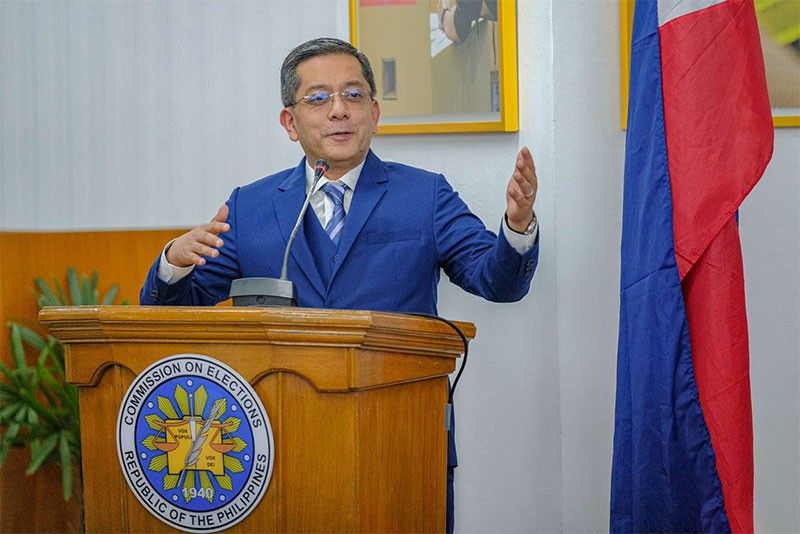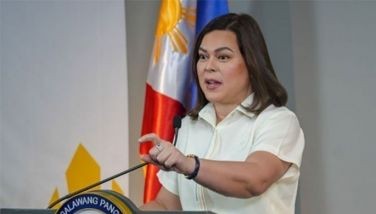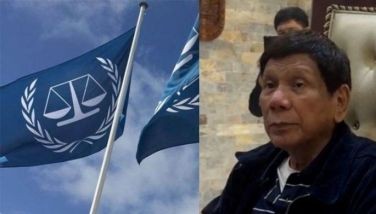Comelec to bets: Election not a war

MANILA, Philippines — As election violence intensifies, Commission on Elections (Comelec) Chairman George Garcia reminded candidates in the midterm polls in May that the electoral exercise is not a war.
“Despite the competition, we should remain friends and brethren. It should unite us rather than divide,” Garcia said yesterday as he urged candidates and their supporters to rein in their emotions.
“Candidates should be the best example of statesmanship,” Garcia said amid the reported rise in the number of election-related violence.
Election watchdog National Citizens Movement for Free Elections (NAMFREL) has expressed concern over the alarming rise in election-related violence as election day approaches.
NAMFREL said the violent incidents undermine the principles of democracy and threaten the integrity of the electoral process. It urged all candidates, political parties and their supporters to reject violence.
“We urge all stakeholders to prioritize peace and orderliness as the campaign period begins,” the group said.
Along with other civil society groups, NAMFREL said that it would monitor potential flashpoints of violence and take measures to prevent escalation before harm occurs.
Meanwhile, at least 39 suspected election-related incidents (ERIs) have been recorded by the Philippine National Police, according to PNP spokesperson Brig. Gen. Jean Fajardo.
Of the 39 cases reported, Fajardo said 11 were confirmed to be election-related, 23 cases found to have no connection to the elections, and five still under investigation.
Fajardo noted that the number of validated ERIs remains lower compared to previous elections, particularly the 2019 midterm polls.
However, she cautioned that the election period lasts until June 11, and authorities remain on alert to prevent any escalation, especially as the local campaign period has begun.
“We know that local elections tend to be more intense because candidates often come from the same families, communities, or social circles. That is why we are closely monitoring the situation to ensure that validated ERIs do not increase,” Fajardo said over dzBB radio.
Fajardo also reported a decline in the number of areas classified as election areas of concern (EACs), from 403 recorded by the Comelec on Jan. 8 down to 386 as of March 19.
The red and orange category areas saw reductions, with some moving to the yellow category, while some previously classified as yellow were downgraded to green, meaning they are no longer considered at risk.
One of the contributing factors to this improvement, according to Fajardo, is the swift response to security concerns raised by political aspirants.
She credited the Comelec’s proactive approach, noting that Chairman Garcia and law enforcement agencies have been conducting security assessments in high-risk areas.
“We continuously address election risk factors such as intense political rivalries, private armed groups, serious security threats, and loose firearms. These efforts have helped reduce the number of EACs,” she said.
Among the 11 validated ERIs, five are undergoing preliminary investigation, with cases already filed. Some suspects remain at large, but Fajardo confirmed that elected officials, incumbents and aspirants are among those charged.
“We will not allow these cases to be disregarded. We are committed to ensuring that those involved in election-related violence are held accountable,” she said.
The PNP has been on heightened alert since March 24, in response to the simultaneous national and local election campaigns. The alert status will remain in place until the elections conclude, Fajardo said.
Beginning April 1, the PNP will also monitor summer vacation activities, including the Holy Week exodus and major public events.
With the heightened alert, at least 75 percent of the PNP’s total force is deployed. Regular duty shifts have been extended from 12 hours to 15 hours to ensure continuous security coverage.
“Our deployment focuses on major roads, campaign sorties, transportation terminals, tourist destinations, and other public convergence areas,” Fajardo said, adding that they want to ensure that all major events run smoothly and securely.
Accreditation for observers until April 15
There’s only 15 days left for those intending to observe the conduct of the coming national and local polls to file for accreditation with the Comelec.
The Comelec issued the resolution setting April 15 as the deadline for the filing of accreditation for both domestic and foreign observers in the scheduled May 12 elections.
Only Comelec-accredited domestic and foreign observers shall be given access to government facilities and polling precincts during the elections.
“All Philippine nationals, whether as individuals or in groups, whether representing government or civil society interests, who are interested to observe the conduct of the 2025 NLE shall file their applications,” the Comelec said.
Individuals who are invited by the commission to participate in the Comelec’s Guided International Election Observation Program must still comply with existing policies on the entry of foreign nationals as visitors to the Philippines and must secure entry visas.
To qualify for accreditation, Comelec said, the applicants must have a bonafide good intention to participate exclusively as an observer.
“The observer-applicants must be free from any political, economic, or other conflicts of interests that would interfere with the conduct of the election observations impartially,” the Comelec stressed.
Comelec requires applicants to disclose their intention to take part in the conduct of the elections as election observers. Applications may be sent via e-mail to election.observers@comelec.gov.ph, with the documentary requirements.
Those based in the National Capital Region may personally submit the application or through an authorized representative while those based outside of Metro Manila may submit to the nearest Office of the Regional Director, where they reside or hold office.
Duly accredited observers will be allowed access to all stages of the electoral process, including preparatory activities, but subject to conditions as may be necessary for the protection of Comelec personnel, property, privileged information, and the integrity of the elections.
Observers are expected to submit a report of their observation mission to the commission not later than June 11.
Comelec prohibits the observers from engaging in partisan political activities or acts designed to affect the results of the elections and contribute or make any expenditure in connection with any election campaign or partisan political activity.
Observers are also barred from mingling and talking with voters inside any polling place, nor shall they threaten, intimidate, or actually cause any violence and propagate false and alarming reports relating to the conduct of the elections.
Any violation of the prohibited acts, the Comelec said, is punishable as an election offense. — Mark Ernest Villeza
- Latest
- Trending






























